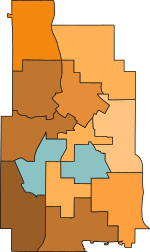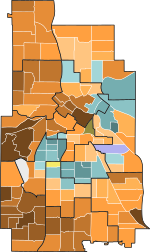| |||||||||||||||||||||
| |||||||||||||||||||||
First preference votes by ward Frey: 30–34% 35–39% 40–44% 45–49% 50–54% 55–59% 60–64% Nezhad: 30–34% 35–39% 40–44% 45–49% 50–54% Knuth: 30–34% Awed: 40–44% 55–59% | |||||||||||||||||||||
| |||||||||||||||||||||
| Elections in Minnesota |
|---|
 |
A mayoral election was held on November 2, 2021, to elect the mayor of the U.S. city of Minneapolis. Incumbent DFL mayor Jacob Frey won reelection to a second term, becoming the first Minneapolis mayor to win a second term since R. T. Rybak in 2005. Minneapolis mayoral elections use instant-runoff voting, also known as ranked-choice voting. All candidates appear on the same ballot and there is no primary election, nor is there a runoff. Minneapolis's twin city, Saint Paul, also held a mayoral election on the same day, using the same system.
The election came in the wake of a tumultuous period for Minneapolis, deeply affected by the murder of George Floyd and subsequent civil unrest.[2] Frey's campaign faced challenges from a crowded field of candidates, including former state Representative Kate Knuth and community organizer Sheila Nezhad. Both Knuth and Nezhad aligned with more progressive factions within the DFL and advocated for policing reforms and formed an alliance urging their supporters to rank them as their top choices and exclude Frey from their preferences.[3][4]
The election also featured discussions on issues such as affordable housing, climate change, and economic recovery post-COVID-19 lockdowns.[5]
- ^ "Minneapolis-St. Paul Election Results". The New York Times. November 2, 2021.
- ^ Rio, Giulia McDonnell Nieto del; Eligon, John; Hassan, Adeel (May 25, 2021). "A Timeline of What Has Happened in the Year Since George Floyd's Death". The New York Times. Retrieved November 11, 2023.
- ^ Gustavo, Solomon (June 18, 2021). "Four takeaways from the Minneapolis DFL's mayoral endorsement process". MinnPost. Retrieved March 2, 2024.
- ^ Kaul, Greta (October 26, 2021). "An internal poll showed Frey with a 19-point lead in the Minneapolis mayoral race. But in an RCV election, he could still lose". MinnPost. Retrieved March 2, 2024.
- ^ Collins, Jon; Birnstengel, Grace (October 20, 2021). "Voter guide: Minneapolis mayoral candidates". MPR News. Retrieved March 2, 2024.





